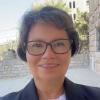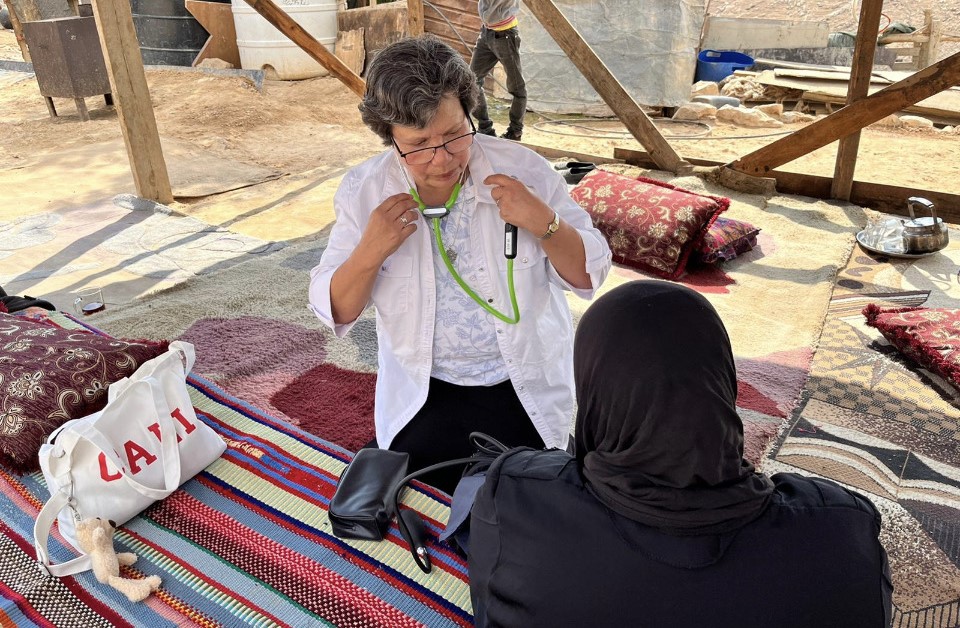
Sr. Julia Hurtado nurses an elderly bedouin at El Montar Bedouin Camp in the Judean Desert. Twice a week, she travels about 45 minutes by bus to meet two Comboni Sisters, then they together drive long distances on bumpy dirt roads to reach the desert camps. (Courtesy of Julia Hurtado)
Presentation of the Blessed Virgin Mary sisters have been in the Holy Land for 10 years. Two sisters from India and one from Zimbabwe were the first to arrive. I am a Mexican American from Los Angeles, California, in the United States and was finally granted my visa in February 2022 after the country opened its borders following the COVID-19 pandemic.
Since my arrival, I have been learning Arabic, a challenging and beautiful language that includes many prayers that call on God, "Allah" in Arabic, to protect, to grant peace and to give health. People bestow daily blessings on each other at each meeting, making God and faith very much alive among Christians (Catholic, Greek Orthodox and Protestant) and Muslims, evident in the sounds of church bells or the Muslim call to prayer broadcast over speakers five times a day. They serve as constant reminders that even in their struggles, the people continue to rely on God. Many scriptural verses come alive for me as I hear them, and I feel so blessed to be able to minister in this special land.
I am learning not to "fix" their problems, but to accompany them and be present to them in their pain and struggles.
I didn't know why God called me here but I knew God would provide me a ministry to use my knowledge and skills as a registered nurse, along with other God-given gifts. One of my favorites has been working with the Bedouin communities. They were evicted from their original land and now established semi-permanent camps in the Judean Desert of the West Bank, where they can maintain their traditional lifestyle. Most of these communities are now settled, although some remain semi-nomadic, primarily engaged in sheep and goat herding. Their semi-permanent homes are constructed of corrugated aluminum or large pieces of plywood, and in some areas, a few have begun building homes with concrete. Israeli settlements have been built close to some of the camps, which has been difficult for them at times.
I have been partnering with two Comboni Sisters in these Bedouin camps since October 2022. The sisters are proficient in Arabic, having spoken it for many years. Their ministry primarily involves supervising several Bedouin kindergartens and an after-school care program. They also reach out to families in other camps, making connections and letting the people know that we are there to support them. Twice a week, I travel approximately 45 minutes by bus to meet them, and together, we drive long distances on bumpy dirt roads to reach the desert camps. I carry my nursing bag, equipped with the tools to check blood pressures and blood sugars and to perform other nursing duties.
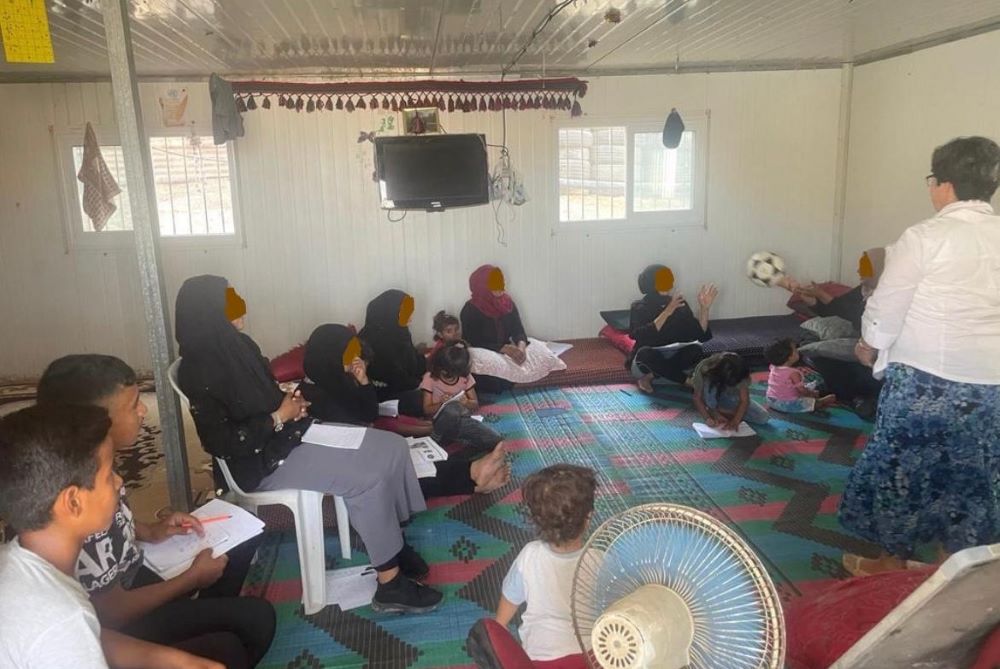
Sr. Julia Hurtado meets with families who live in Bedouin camps in simple, one-bedroom homes, often made of corrugated aluminum or large pieces of plywood. In addition to her ministry nursing and teaching English, Bedouin women teach her to milk goats, make cheese and pick wild plants to be used for food. (Courtesy of Julia Hurtado)
In addition to their supervisory roles, the sisters teach English to the Bedouin women and girls in the camps. Last year, I was invited to start English classes with the women. I taught a small group in a one-room home one afternoon and another group in a different camp another afternoon. Despite my limited proficiency in spoken Arabic, I can still effectively communicate and teach. It has been amazing that, even though I am not fluent in their language, we still manage to understand each other. Of course, hand signs help a lot. I firmly believe that the language of the heart transcends words, as we communicate through our mutual care, smiles and laughter.
Medical care in the camps is a great need, but often, the people are deprived of it. Doctors and nurses might visit every few months to conduct health checks. Treatment for childhood conditions that could be treated in the early stages elsewhere are not available, leading to prolonged suffering. I have been able to teach mothers physical and occupational therapies to use with their children with disabilities.
One teen girl I worked with had a progressive spastic muscle weakness condition. Since there was no cure, all I could do was teach her exercises to maintain her strength. With the help of donors, I obtained a wheelchair and walker so that she could be more independent. In another camp, a little girl, just a year and a half old, also struggled with weak muscles that kept her from crawling or standing. I taught her mother some exercises she could do with the child. The girl was also developmentally delayed; it is uncertain if she will ever walk. Again, with the help of donors, I acquired a stroller for her.
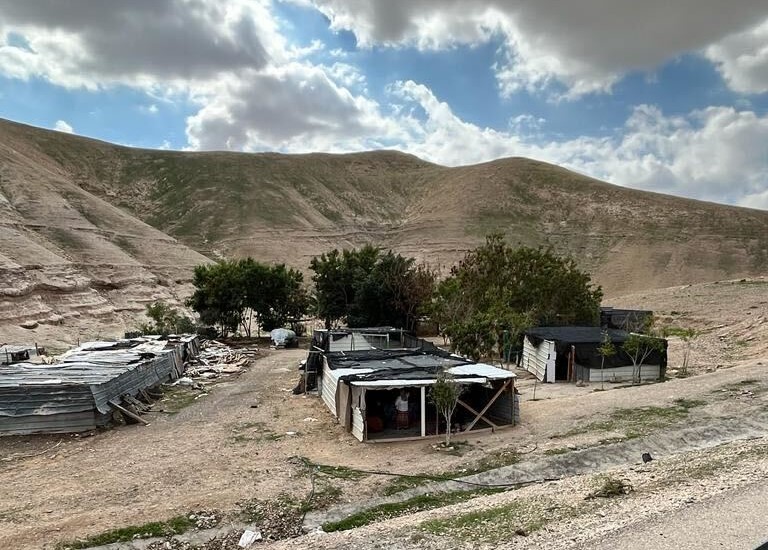
Bedouin communities were evicted from their original land and have established semi-permanent camps in the Judean Desert of the West Bank, where they can maintain their traditional lifestyle. (Courtesy of Julia Hurtado)
Recently, we visited a family with a severely deformed baby, and my heart broke because there was nothing I could do for him. The mother looked at me, as if pleading for help. Despite my many years in nursing, it's the first time that there is no access to resources. I am not used to this feeling of helplessness, where I can't provide care or do something to help. This is a feeling I have had many times here. I am learning not to "fix" their problems, but to accompany them and be present to them in their pain and struggles.
Another thing I love about this ministry is the opportunity to learn about the lifestyle of the Bedouin women and their daily duties and activities. They have graciously taught me skills used in their daily tasks, such as milking a goat, making cheese and picking wild plants to be used for food. In some camps, goats and sheep serve as the primary source of income, while in others, many men work outside the camps. Some women generate income from sales of their beautiful cross-stitch work and the shawls, blankets and rugs they make from sheeps' wool. In the past few months, the sisters began teaching other crafts to serve as a source of income for the women to empower them.
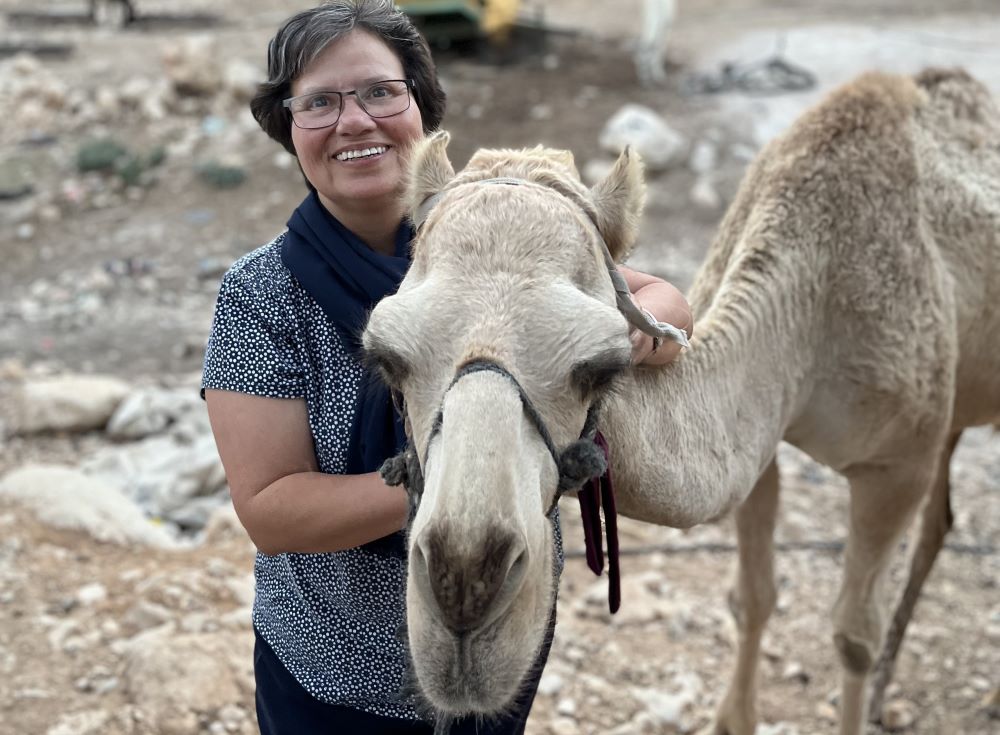
Sr. Julia Hurtado is seen with a camel in the Judean Desert. She has been ministering to people in Bedouin camps there since October 2022, (Courtesy of Julia Hurtado)
These women have also graciously shared with me their talents of cooking and hospitality. Even though they have very little, they are remarkably generous, providing dish after dish of mouth-watering foods. Fresh hubas-shrak bread is prepared daily, and on special occasions, they cook makluba, a dish of rice topped with roasted vegetables and chicken, served with yogurt and a finely chopped cucumber and tomato salad. During every meal and any visit, we are always served black Arabic coffee in small cups and/or a black sweet tea mixed with mint or sage, which is surprisingly delicious.
Advertisement
Children also benefit from the sisters' work during summer when they can enjoy camp. This year, we held eight summer camps at different locations. Three of the sisters and I were present at four locations for two weeks, followed by four other camps in the last two weeks of July. Most of the camps had two teachers and a couple of helpers, each hosting 20 to 60 children, ranging from 3 to 13 years old. It was an absolutely wonderful experience, even though playing outside in temperatures above 90 degrees was hot and tiring. However, the children didn't seem to mind, as they are used to the extreme heat.
In the mornings we had many games and dancing, and as it got hotter, we did craft activities with the children. When it got really hot, we had a few water balloon games to cool off. I believe we helped build the children's confidence as they discovered their own creativity at craft-making and teamwork. For many children, it was a first-time experience, and they loved it so much they didn't want it to end.
I have a deep love for this special ministry, and I'm aware I receive as much joy and happiness as the people do from whatever services we provide. Our hope is that our presence builds community and trust, and that we radiate Christ's love and hope to them in their daily struggles and uncertainties, so that they know what a gift they are to us and we to them.
